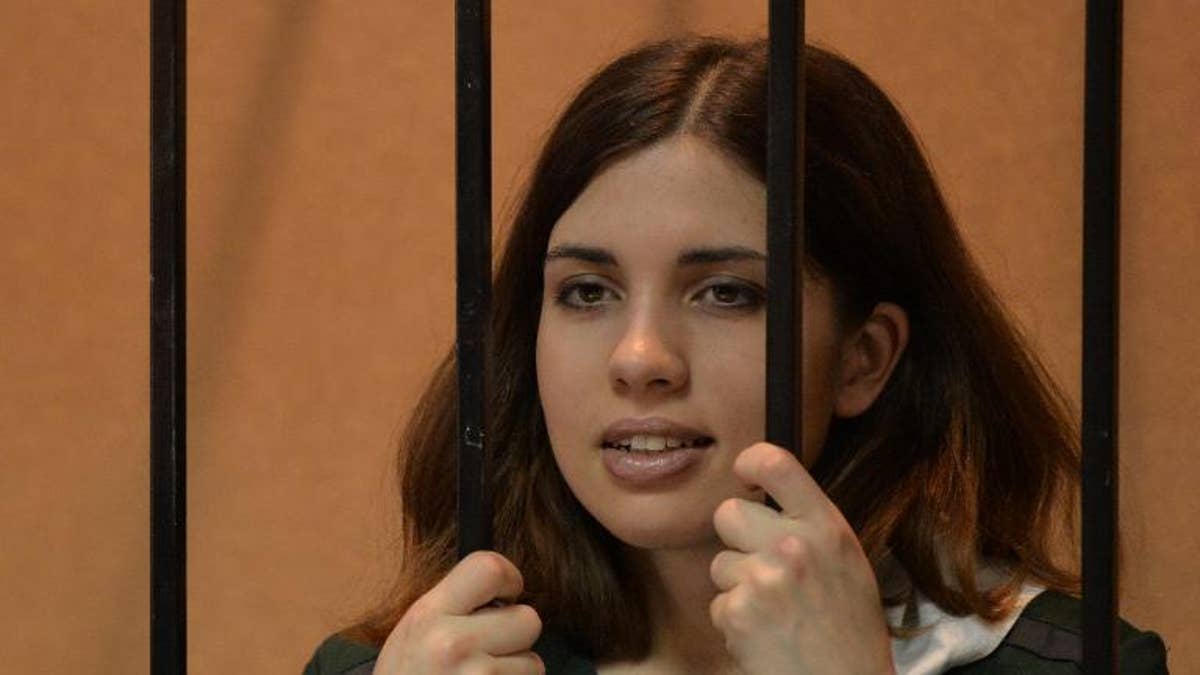
"Pussy Riot" punk Nadezhda Tolokonnikova waits in the defendant's cage at a courthouse in Zubova Polyana, on April 26, 2013. (AFP/File)
Moscow (AFP) – Jailed hunger-striking Pussy Riot punk band member, Nadezhda Tolokonnikova, who is refusing food in protest over what she has called murder threats and "slave labour conditions," was on Sunday moved to a hospital, an official said.
An officer on duty at the hospital No 21 in the village of Barashevo in the Mordovia region said that Tolokonnikova, who entered her seventh day of hunger strike on Sunday, was moved earlier in the day.
"Doctors accepted her," Major Sergei Shalin told AFP by phone. The hospital is part of the prison system but is located outside Tolokonnikova's penal colony.
Tolokonnikova's husband, activist Pyotr Verzilov, said several sources among prison employees and inmates had told him his wife had been moved from prison.
"We are now outside the hospital," he told AFP, adding he would seek a meeting with his wife.
Mordovia's prison administration later released a statement, confirming Tolokonnikova had agreed to be moved to the hospital so that her health could be monitored.
Earlier Sunday, Verzilov issued an open letter addressed to the head of the Federal Service for the Execution of Punishment which oversees prisons, complaining that Tolokonnikova had been held incommunicado for more than 60 hours.
Tolokonnikova went on a hunger strike on Monday, releasing an open letter in which she described harrowing conditions at her prison.
Female inmates have to work for up to 17 hours, sleep four hours and endure repeated abuse, she claimed. Tolokonnikova also complained of what she said were death threats from the prison's deputy chief over her complaints.
On the fifth day of her hunger strike Friday, Tolokonnikova was moved to the medical unit of her penal colony after her health worsened.
Verzilov's Voina (War) art group described her condition at the time as "terrible."
Tolokonnikova said she would refuse food until she's transferred to another prison.
The 23-year-old mother of a young daughter is serving a two-year sentence for a punk protest against President Vladimir Putin in a Moscow church last year.
Observers have said that the unrepentant activist was deliberately sent to Mordovia -- notorious for its network of Soviet-era Gulag prison camps -- in a bid to break her will.
The open letter came after the counterculture activist had over the past year sought to come to terms with her imprisonment, sharing philosophy books with her fellow inmates and learning to sew police uniforms.
Pressure began to build when she tried to stand up for prisoners' rights, her defence said.
She claimed several prisoners were forced to sew in the workshop naked as punishment for working slowly.
A system of collective punishment and a culture of violence saw prison staff encouraging inmates to beat up rule-breakers.
'The icy breath of the Gulag'
Tolokonnikova's lawyer Irina Khrunova, speaking to opposition newspaper Novaya Gazeta in an interview released on Saturday, said HIV patients were forced to work on a par with healthy prisoners, noting prison administration had pitted Tolokonnikova against other inmates.
"She had porridge poured over her head in a canteen," Khrunova said. "It's difficult to imagine what you feel when you stand alone with 500 people against you, and everyone wants you dead."
Tolokonnikova's hunger strike and letter drew fresh attention to routine prisoner abuse in Russia. Prison management denies the charges.
Political analyst Alexander Golts said Tolokonnikova's description of the "monstrous detention conditions" shocked many in Russia.
"This is an icy breath of the Gulag," he wrote on the opposition online portal ej.ru.
"Hundreds of today's inmates, the tens of thousands who have already gone through this hell take all these tortures in stride. They are not trying to protest, are not trying to punish their tormentors. They have been crushed."
Tolokonnikova and the other jailed Pussy Riot member Maria Alyokhina are scheduled for release in March.
Alyokhina has also repeatedly complained about prisoner rights abuses in her prison colony in the Perm region.
President Putin has called the women's sentence correct and repeatedly defended the tough verdict from criticism by Western leaders including German Chancellor Angela Merkel and celebrities like Madonna.
